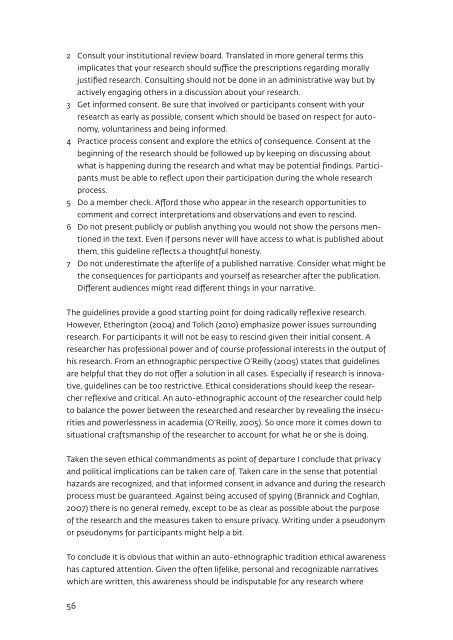Rumbling on performativity_Frits Simon
Rumbling on performativity_Frits Simon
Rumbling on performativity_Frits Simon
Create successful ePaper yourself
Turn your PDF publications into a flip-book with our unique Google optimized e-Paper software.
2 C<strong>on</strong>sult your instituti<strong>on</strong>al review board. Translated in more general terms this<br />
implicates that your research should suffice the prescripti<strong>on</strong>s regarding morally<br />
justified research. C<strong>on</strong>sulting should not be d<strong>on</strong>e in an administrative way but by<br />
actively engaging others in a discussi<strong>on</strong> about your research.<br />
3 Get informed c<strong>on</strong>sent. Be sure that involved or participants c<strong>on</strong>sent with your<br />
research as early as possible, c<strong>on</strong>sent which should be based <strong>on</strong> respect for aut<strong>on</strong>omy,<br />
voluntariness and being informed.<br />
4 Practice process c<strong>on</strong>sent and explore the ethics of c<strong>on</strong>sequence. C<strong>on</strong>sent at the<br />
beginning of the research should be followed up by keeping <strong>on</strong> discussing about<br />
what is happening during the research and what may be potential findings. Participants<br />
must be able to reflect up<strong>on</strong> their participati<strong>on</strong> during the whole research<br />
process.<br />
5 Do a member check. Afford those who appear in the research opportunities to<br />
comment and correct interpretati<strong>on</strong>s and observati<strong>on</strong>s and even to rescind.<br />
6 Do not present publicly or publish anything you would not show the pers<strong>on</strong>s menti<strong>on</strong>ed<br />
in the text. Even if pers<strong>on</strong>s never will have access to what is published about<br />
them, this guideline reflects a thoughtful h<strong>on</strong>esty.<br />
7 Do not underestimate the afterlife of a published narrative. C<strong>on</strong>sider what might be<br />
the c<strong>on</strong>sequences for participants and yourself as researcher after the publicati<strong>on</strong>.<br />
Different audiences might read different things in your narrative.<br />
The guidelines provide a good starting point for doing radically reflexive research.<br />
However, Etheringt<strong>on</strong> (2004) and Tolich (2010) emphasize power issues surrounding<br />
research. For participants it will not be easy to rescind given their initial c<strong>on</strong>sent. A<br />
researcher has professi<strong>on</strong>al power and of course professi<strong>on</strong>al interests in the output of<br />
his research. From an ethnographic perspective O’Reilly (2005) states that guidelines<br />
are helpful that they do not offer a soluti<strong>on</strong> in all cases. Especially if research is innovative,<br />
guidelines can be too restrictive. Ethical c<strong>on</strong>siderati<strong>on</strong>s should keep the researcher<br />
reflexive and critical. An auto-ethnographic account of the researcher could help<br />
to balance the power between the researched and researcher by revealing the insecurities<br />
and powerlessness in academia (O'Reilly, 2005). So <strong>on</strong>ce more it comes down to<br />
situati<strong>on</strong>al craftsmanship of the researcher to account for what he or she is doing.<br />
Taken the seven ethical commandments as point of departure I c<strong>on</strong>clude that privacy<br />
and political implicati<strong>on</strong>s can be taken care of. Taken care in the sense that potential<br />
hazards are recognized, and that informed c<strong>on</strong>sent in advance and during the research<br />
process must be guaranteed. Against being accused of spying (Brannick and Coghlan,<br />
2007) there is no general remedy, except to be as clear as possible about the purpose<br />
of the research and the measures taken to ensure privacy. Writing under a pseud<strong>on</strong>ym<br />
or pseud<strong>on</strong>yms for participants might help a bit.<br />
To c<strong>on</strong>clude it is obvious that within an auto-ethnographic traditi<strong>on</strong> ethical awareness<br />
has captured attenti<strong>on</strong>. Given the often lifelike, pers<strong>on</strong>al and recognizable narratives<br />
which are written, this awareness should be indisputable for any research where<br />
56



